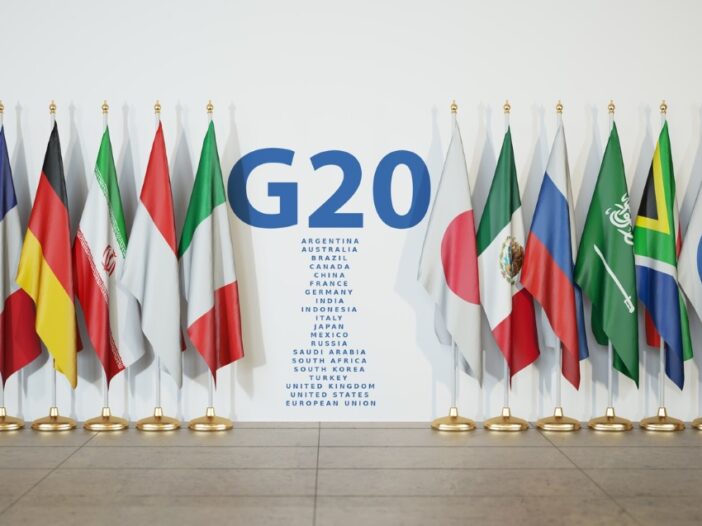Dear Reader,
We haven’t heard much about the G20 Leaders’ Summit lately. That may be about to change. The G20 is a multilateral organisation that superseded the G7 as the leading forum for global joint action and discussion about 12 years ago.
The G7 are the world’s seven largest developed economies (the US, the UK, Italy, France, Germany, Canada and Japan). That’s a powerful group, but it leaves out the world’s second largest economy (China), the world’s largest nuclear power (Russia), and the world’s second leading oil producer (Saudi Arabia). The G20 was an effort to enlarge the group to include important developing economies.
In addition to the G7 and China, Russia and Saudi Arabia, the group includes Australia, India, South Africa, Turkey, Argentina, Brazil, Mexico, Indonesia and South Korea. The 20th seat is reserved for a representative of the EU. In addition, a number of guests are invited, including Spain and a rotating list of African countries.
How to Survive Australia’s Biggest Recession in 90 Years. Download your free report and learn more.
The changing nature of G20 meetings
The G20 Leaders’ Summit is a once-a-year event at which the political leaders meet in person. G20 was a powerful forum during the 2008–10 global financial crisis and it continued its work on global taxation, global bank regulation and climate change initiatives through 2016.
Donald Trump’s America First anti-globalist agenda diminished the role of the G20. Trump preferred bilateral diplomacy to multilateral meetings.
In 2020, no in-person summit meeting will be held because of COVID, but a virtual G20 leaders meeting was hosted in Riyadh, Saudi Arabia on 21–22 November. Yet, according to this article, G20 meetings will again be a powerful forum under the new administration of Joe Biden.
From America first to America last
The article encourages Biden to call for an in-person summit early in 2021. The idea is to restart multilateral diplomacy and create an environment where the US could once again cosy up to China and pursue global remedies on climate change, deficit spending, and debt forgiveness for developing nations.
This will be a good deal for enemies of the US and debtors, but a bad deal for US taxpayers. The process of outsourcing US jobs, imposing global taxation, and wasting money on a non-existent climate crisis (to promote global governance) will be back in full swing.
Keep your eye on the G20. If Biden becomes president, the American First policy will revert to America Last. That’s good news for global bureaucracy and bad news for US business.
Business is consistently wrong about politics
There’s a notion that top businesspeople are highly intelligent, plugged-in, and therefore savvy about US politics and the situation in government.
The first part of that statement is generally true. Successful businesspeople are either creative entrepreneurs or they work their way up a larger organisation against tough competition. So, they tend to be intelligent and good at what they do.
The second part about being ‘plugged-in’ is only partly true. Businesspeople do have ready access to a network of colleagues, competitors and experts, which gives them access to the latest thinking on a wide variety of topics.
The problem is that those network members are a closed-circuit of like-minded individuals who all meet with each other and constitute a bubble of groupthink and an echo chamber where the same ideas are heard over and over. There is no cognitive diversity where out-of-the box ideas get a hearing. (The best advice comes from the rare individuals who live in an alternative state-space where there are no boxes.)
The biggest myth of all
But the last idea about being ‘savvy about US politics’ is the biggest myth of all. The fact is that most businesspeople would be happy to avoid Washington, DC entirely and are equally happy if Washington ignores them. They think they understand Washington, but they don’t.
This article is just the latest example of that ignorance. The article reports that the business community is pleased with the idea of ‘divided government’. They expect that the White House and House of Representatives will be controlled by Joe Biden and Nancy Pelosi, while the Senate will be controlled by Republicans led by Mitch McConnell.
The result will be gridlock. When nothing gets done in Washington, business can plan further in advance or go about their business without worrying about new taxes, regulations or mandates.
What could go wrong? A lot
First of all, the presidential election is not over, and Donald Trump could still win. We’ll know by 8 December.
Secondly, control of the Senate is not settled. If Democrats win two runoff elections in Georgia, the Democrats will control the Senate. We’ll know on 5 January.
Finally, the Democrats lost so many seats in the House (12 and counting) that a coalition of Republicans and moderate anti-Pelosi Democrats might unite to elect Republican Kevin McCarthy as Speaker of the House. We could know as early as 3 January.
Depending on how those events play out, we could have Republican control (Trump, McConnell, McCarthy), Democratic control (Biden, Schumer, Pelosi), or a mixed bag that’s different from what business expects (Biden, McConnell, McCarthy).
Once again, business is complacent and is probably missing an imminent upset to their presumed gridlock. Don’t be surprised at coming market volatility when business complacency gets the boot.
All the best,
 |
Jim Rickards,
Strategist, The Daily Reckoning Australia
PS: Why Australia is set to become the next ‘gold epicentre’ — which could result in a HUGE spike in Aussie gold stock prices. Click here to learn more.

